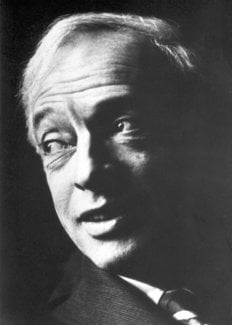Saul Bellow
Biographical

Saul Bellow was born in Lachine, Quebec, a suburb of Montreal, in 1915, and was raised in Chicago. He attended the University of Chicago, received his Bachelor’s degree from Northwestern University in 1937, with honors in sociology and anthropology, did graduate work at the University of Wisconsin, and served in the Merchant Marine during World War II.
Mr. Bellow’s first novel, Dangling Man, was published in 1944, and his second, The Victim, in 1947. In 1948 he was awarded a Guggenheim Fellowship and spent two years in Paris and traveling in Europe, where he began The Adventures of Augie March, which won the National Book Award for fiction in 1954. Later books include Seize The Day (1956), Henderson The Rain King (1959), Herzog (1964), Mosby’s Memoirs and Other Stories (1968), and Mr. Sammler’s Planet (1970). His most recent work of fiction, Humboldt’s Gift (1975), was awarded the Pulitzer Prize. Both Herzog and Mr. Sammler’s Planet were awarded the National Book Award for fiction. Mr. Bellow’s first non-fiction work, To Jerusalem and Back: A Personal Account, published on October 25,1976, is his personal and literary record of his sojourn in Israel during several months in 1975.
In 1965 Mr. Bellow was awarded the International Literary Prize for Herzog, becoming the first American to receive the prize. In January 1968 the Republic of France awarded him the Croix de Chevalier des Arts et Lettres, the highest literary distinction awarded by that nation to non-citizens, and in March 1968 he received the B’nai B’rith Jewish Heritage Award for “excellence in Jewish literature”, and in November 1976 he was awarded the America’s Democratic Legacy Award of the Anti-Defamation League of B’nai B’rith, the first time this award has been made to a literary personage.
A playwright as well as a novelist, Saul Bellow is the author of The Last Analysis and of three short plays, collectively entitled Under the Weather, which were produced on Broadway in 1966. He has contributed fiction to Partisan Review, Playboy, Harper’s Bazaar, The New Yorker, Esquire, and to literary quarterlies. His criticism has appeared in The New York Times Book Review, Horizon, Encounter, The New Republic, The New Leader, and elsewhere. During the 1967 Arab-lsraeli conflict, he served as a war correspondent for Newsday. He has taught at Bard College, Princeton University, and the University of Minnesota, and is a member of the Committee on Social Thought at the University of Chicago.
| Further works |
| To Jerusalem and Back. A Personal Account, 1976 |
| Him with His Foot in his Mouth and Other Stories, 1984 |
| More Die of Heartbreak. A Novel, 1987 |
| The Bellarosa Connection. A Novella, 1989 |
| A Theft (novella), 1989 |
| Something to Remember Me By. Three Tales, 1992 |
This autobiography/biography was written at the time of the award and first published in the book series Les Prix Nobel. It was later edited and republished in Nobel Lectures. To cite this document, always state the source as shown above.
For more updated biographical information, see: Bellow, Saul, “Memoirs of a Bootlegger’s Son”. In Granta, 41, pp. 9-36, 1992.
Saul Bellow died on April 5, 2005.
Nobel Prizes and laureates
Six prizes were awarded for achievements that have conferred the greatest benefit to humankind. The 14 laureates' work and discoveries range from quantum tunnelling to promoting democratic rights.
See them all presented here.
